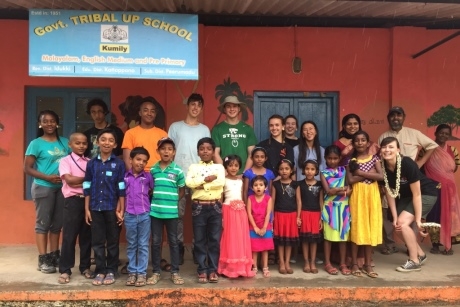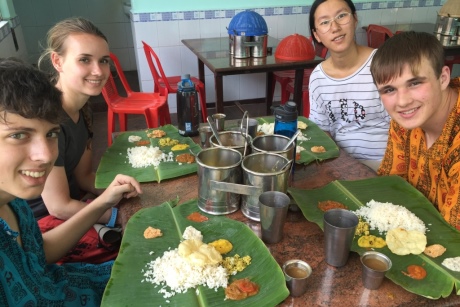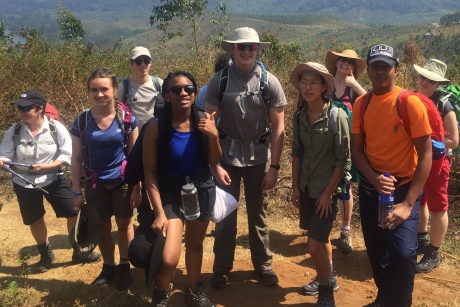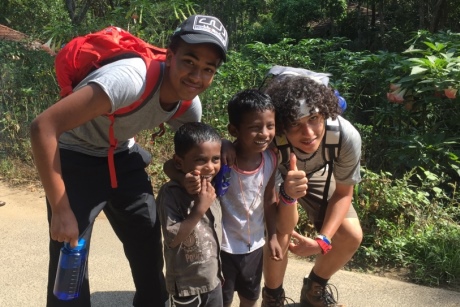
School: International Community School (ICS), London
Subject: Character education, life skills and leadership
KS: 4
Number of pupils: 8
Camping in tea plantations, travelling with locals in packed buses and seeing elephants in the wild (and avoiding them) were among the many unforgettable experiences that greeted a group of London teenagers during a recent trip to India.
Every year the International Community School (ICS) organises a trip to a lower income country to give Year 11 and 12 pupils the opportunity to engage in a skills sharing programme. The trip itinerary is always focussed around community action and service.
Previous countries visited include Ghana and Vietnam, and this year the school went to Kerala, the state in southern India known as ‘God’s own country’.
Aside from the amazing – and often challenging – nature of the visit earlier this year, the group of 15 to 17-year-olds were involved in much more than the trip itself.
Head teacher Stuart Pollard explained: “Learners are involved in all stages of planning and make decisions that will affect their experience and that of those around them. Students lead most day to day aspects of the trip, from arranging accommodation, transport and food to controlling the overall budget.”
The 15-day experience was organised through World Challenge, a leading provider of life-changing school expeditions. The provider’s trips are designed to develop important life skills and help students to hone teamwork and leadership abilities, gain confidence and self-esteem, become more globally aware and enhance their future employment prospects.
The company offers bespoke educational programmes built around four distinct stages – acclimatisation, trekking, a community project and a rest and relaxation phase.

Pictured: Tucking into local dishes.
Stuart said: “This was ICS’s third World Challenge expedition, but my first. We chose to work with them as an organisation because of their range of destinations, their safety and security infrastructure, and their commitment to meaningful sustainable community projects.
“We chose India as we wanted to find the right balance between a trip being challenging but also safe. India is culturally far removed from London living. However, many people speak English so interaction is possible. India is a total assault on the senses, and you could see that as soon as the students arrive, their eyes widen, their jaws drop a little. It is difficult to find locations where students can experience this.”
The eight pupils were accompanied by two ICS staff and a World Challenge leader, and Stuart said the main role of the teachers was to take care of health and safety issues and act as facilitators and problem solvers.
“Extreme heat and humidity magnified every challenge and interaction, as Kerala was experiencing a heatwave, with temperatures reaching 40 degrees and humidity levels at 80 to 90 per cent” he said.
“The challenge for the teacher is to sit back and let the students lead the trip, only intervening when absolutely necessary. As the trip progressed we, as leaders, were involved less in resolving group dynamics and contentions and left it to the group to resolve for themselves. This was not easy, but was ultimately beneficial to the students.”
He said that each day brought a new challenge, and it was gratifying to see how the students coped with various demands and how they became more confident with every hurdle that was crossed.

Pictured: Students trekked up to 15-kilometres a day.
“During the acclimatisation stage they had to get used to the local currency, and this involved bargaining over currency exchange and trying to get the best deal for their budget. Real Indian food was another big discovery for them. Yet after a few days, students preferred to eat local dishes rather than tourist fayre. The realised it was much more delicious as well as being more economical.
“In the next phase they were trekking up to 15 kilometres a day in very hot conditions. Each day they became better walking together as a group and interacting with each other. The tough conditions were offset by stunning views, seeing elephants in the wild and evading elephants in the wild! They camped in stunning locations that included tea and cardamom plantations.”
The group travelled around on packed public buses, with bumpy journeys of up to six hours at a time.
“After some trepidation, the students actually preferred these bus rides to the VIP air-conditioned private bus we used earlier on the trip,” said Stuart. “The students also bought clothes, shopping in the local town away from the tourist trail, and negotiated rickshaw travel. Each student also got the opportunity to ‘lead’ two days of the trip. There was a marked improvement in the leadership skills of every student at their second attempt.”
The community project involved hands-on work at a school in the small town of Kumily, where the students engaged with the local community and got a first-hand experience of seeing day-to-day life in ‘real’ India.
“The project involved painting, cleaning and creating a more welcoming learning environment,” said Stuart. “The group also engaged with a local tiler to do some work in the school. The challenge of adapting to local working practices was tough for some students. They needed to demonstrate great intercultural understanding, resilience and flexibility in order to overcome the challenges of working with the local community, meeting their needs and ensuring that the job ‘got done’.
“They learned to put themselves in the shoes of others, to expect the unexpected, and to be patient, adaptable and display empathy.”
The rest and relaxation phase involved staying on a house boat on one of Kerala’s famous backwaters.

Pictured: With young locals from the small town of Kumily.
“It was enforced R&R as when you’re on a boat, there’s not much you can do but rest and take in the scenery,” said Stuart. “The house boats meander along at a sedentary pace. Students could snooze, watch the world slowly pass them, talk, play cards and generally chill out. This might sound a little bit boring, but in high-octane, sensory overloading India, opportunities to chill out are relished.”
Needless to say, the trip involved many highlights and the parts the students enjoyed most were experiencing a new culture and meeting people, the trekking and volunteering aspect of the visit, elephant riding, buying real Indian clothes from a real India clothing shop and the unique atmosphere of India, which was unlike anything they had previously experienced.
Summing up Stuart said: “This was a trip that changed the learners’ lives and made an impact on the people of Kumily.”
Back in the classroom
Back at school the ICS students participated in reflection sessions where they were asked to think about how they had changed as a result of the expedition, such as the skills they had developed and how their attitude or mind-set changed. They were also asked to consider if there things they believed before that they did not believe any more.
“It is a challenge in itself noticing or quantifying the change that the individuals in the group went through,” said Stuart. “I have no doubt that more significant and lasting changes are not even evident immediately upon return from the trip.
“As a school, we are very keen that this group of World Challengers inspire and support future generations, so we asked each group member to write a letter of advice to next year’s challengers, such as what would you advise yourself if you were thinking about doing World Challenge? They came back with a lot of very practical advice.”
His favourite: “Go with the flow, even if it gets a little weird.”
01494-427600
www.world-challenge.co.uk










